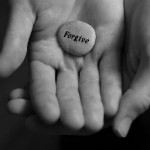
-
“Great minds discuss ideas. Average minds discuss events. Small minds discuss people.” – Eleanor Roosevelt
I have a friend, a woman who is smart and talented, one of the nicest persons I know. She was divorced a few years ago. Whenever I see her, whether it’s the two of us over coffee, or at a larger gathering, she is still talking about her divorce and the latest chapter in the saga. Her husband had an affair, he has a girlfriend now, he doesn’t always stick to the parenting schedule, he has been cheap with the money. Regretfully, this traumatic event in her life has become her calling card. I love her just the same, but she is in the same place emotionally as she was two years ago and that worries me.
This makes me think of Fred Luskin, Director of the Stanford Forgiveness Projects and author of Forgive For Good. I spent a weekend retreat with Fred and his wife nine years ago, and I still remember his insightful teachings. The gist of Fred’s wisdom is this: Everybody has a sad story about something very bad that happened to them. It is often a betrayal or a wrong done to them by another. Sharing the gruesome details of your story with another person has therapeutic benefit—until you have told it more than a handful of times.
After that, Fred’s research has shown that telling your sad story is not really helpful to you. In other words, if you want to heal and move on, it is necessary after a certain point to stop talking about sad events and people who have wronged you. Fred says it is important to get the help you need—from a therapist, a best friend, a support group—so you can process the grief constructively, but to stop making it the central conversation in your daily life.
I think this wisdom applies to everyone in life, and it is particularly important to remember during divorce. It is so easy (and so normal) to let your divorce and the betrayals from your spouse become all-consuming. It is such a painful event when a spouse leaves, an even greater breach of trust when an affair is involved or when your spouse has used the divorce court to bludgeon you. Sharing children as divorced parents is frustrating and difficult, even in the best of circumstances. It’s completely understandable how these events can become almost a part of your identity, a personal wounding that feels like it will never heal or end.
I agree that healing from divorce and learning to deal with the ongoing struggles requires professional counseling or a support group, where you can discuss your pain for many months or even years with those who can help you process it. And yes, it is beneficial to have one close friend in whom you can confide everything throughout the divorce and in the post-divorce years. Outside of these settings, however, think about whether it is doing you any good to keep sharing your sad stories.
True healing begins when you are willing to give up your sad story, when you no longer spend your days talking about past events and people. Forgiveness becomes possible when you begin to focus on ideas–ideas about what went wrong, how you can learn from the past and make changes, what you’d like to create for your future, what kind of future relationship you’d like to have, ideas about how you can contribute your talents to the greater world around you. When you are no longer consumed by your past, you will become unstuck emotionally and spiritually. This is exactly when you will start to move forward into the next chapter of your life. This is exactly when new events and new people will begin to come into your life.
Finally, note that these same rules apply to your friends and family supporting you through divorce. Tell them the best way they can help you is to discuss ideas with you, not what your spouse has done to you or is doing to you. It is hard enough to let go of the past and focus on the future without having a chorus of well-meaning friends reminding you regularly of how you’ve been wronged.